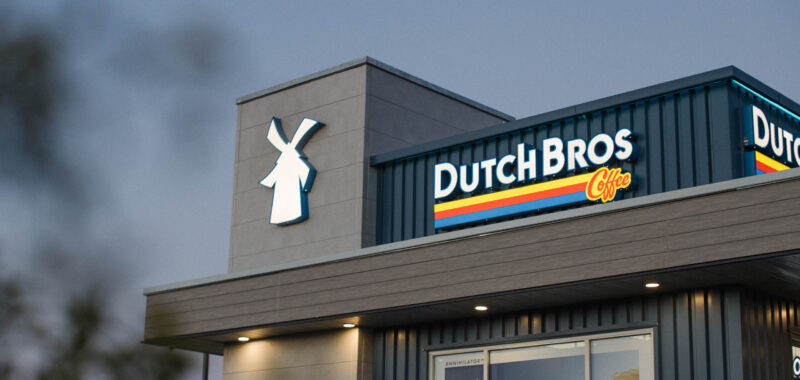The high-growth coffee chain still has a bright future.
Dutch Bros (BROS 0.84%) has gone through some wild swings since its IPO in September 2021. The American drive-thru coffee chain went public at $23 a share, then more than doubled to a record high of $76.25 two months later, but now trades at about $35.
The bulls initially embraced Dutch Bros because it was growing rapidly and seemed destined to disrupt Starbucks. However, they retreated as the company’s growth cooled off and rising rates compressed their valuations. Could it heat up again over the next three years as the macro environment improves?

Image source: Dutch Bros.
What happened to Dutch Bros. over the past three years?
Dutch Bros opened its first drive-thru store in 1994, and it expanded rapidly after it started franchising its new locations in 1999. Before going public, it had already expanded its retail presence from 254 shops in seven states at the end of 2015 to 471 shops in 11 states at the end of June 2021.
It then nearly doubled that brick-and-mortar footprint to 912 shops, including 600 company-operated stores and 312 franchised locations, by the end of June 2024. Its company-operated stores generated 91% of its revenue in the first half of 2024.
Over the past three and a half years, Dutch Bros consistently grew its same-store sales (at locations open for more than 15 months), opened new shops, and generated high double-digit revenue growth. Its adjusted earnings before interest, taxes, depreciation, and amortization (EBITDA) margins also improved as it stayed profitable on a generally accepted accounting principles (GAAP) basis over the past one-and-a-half years.
|
Metric |
2021 |
2022 |
2023 |
1H 2024 |
|---|---|---|---|---|
|
Total Revenue Growth (YOY) |
52.1% |
48.4% |
30.7% |
34.2% |
|
Same-Store Sales Growth (YOY) |
8.4% |
1% |
2.8% |
6.8% |
|
Total Store Count Growth (YOY) |
22% |
24.7% |
23.8% |
21% |
|
Adjusted EBITDA Margin |
16.5% |
12.3% |
16.6% |
19.6% |
|
Net Profit Margin (GAAP) |
(24.3%) |
(2.6%) |
1% |
6.4% |
Data source: Dutch Bros. YOY = Year-over-year.
Dutch Bros’ robust growth was driven by its “fortressing strategy” of flooding regions with new stores. That strategy builds its brand awareness and market share without relying on expensive marketing campaigns. It also raised its prices over the past two years to offset the inflationary pressure on its margins.
What will happen to Dutch Bros over the next three years?
For 2024, Dutch Bros expects to open at least 150 new shops, for its same-store sales to grow by the “low single digits,” and for its total revenue to rise 26% to 27%. It expects its adjusted EBITDA to increase 25% to 31%, with a midpoint full-year margin of 16.8%.
During Dutch Bros’ second-quarter conference call in August, CEO Christine Barone said even though it faces “macro environment noise” and “aggressive price promotion” from some of its peers, it didn’t “need to fundamentally adjust” its long-term strategies — which include bigger ad campaigns, the expansion of its rewards program, and the rollout of new menu items like boba, protein coffee, sodas, and teas to differentiate itself from its competitors.
From 2023 to 2026, analysts expect Dutch Bros to grow its revenue at a compound annual growth rate (CAGR) of 22% as its adjusted EBITDA increases at a CAGR of 24%. On a GAAP basis, they expect its earnings per share (EPS) to jump from $0.03 in 2023 to $0.46 in 2026.
In comparison, analysts expect Starbucks’ revenue and EPS to grow at a CAGR of 5% and 6%, respectively, from 2023 to 2026. However, a lot of that growth will depend on the ability of its new CEO to turn around its struggling North American and Chinese businesses.
Dutch Bros could still have plenty of room to run
Based on these expectations, Dutch Bros’ stock still looks reasonably valued at three times next year’s sales and 18 times its adjusted EBITDA. If it sticks with its growth strategies, which have worked well in recent years, its stock could head higher over the next three years and outperform its industry peers.
Leo Sun has no position in any of the stocks mentioned. The Motley Fool has positions in and recommends Starbucks. The Motley Fool recommends Dutch Bros. The Motley Fool has a disclosure policy.

